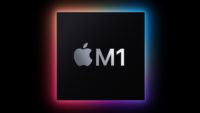Amazon, Apple Lead Movement to Develop Their Own Chips
December 3, 2020
Amazon and Apple are abandoning Intel chip technology in favor of their own Arm-based products. Last month, Apple introduced Mac computers with its own chips and, in June, Amazon began marketing a new computing service based on its Arm chips that the company contends is 20 percent cheaper and faster than its Intel-based services. Amazon is also creating the foundation for building its own quantum computer and its cloud computing division is adding products to allow customers greater local control of their data.
The New York Times reports that “the actions by Apple and Amazon are causing ripple effects across the $400 billion semiconductor industry” that may result, for computer users, in “more technology choices, snappier computing speeds and lower costs.”

Intel’s dominant position in chip manufacturing began in the 1990s, when it became “the biggest supplier of processors for PCs” and, later, servers. But it didn’t make smartphone chips, which Arm (recently purchased by Nvidia from SoftBank for $40 million) did. Now, Broadcom, Qualcomm and other similar companies are designing Arm-based chips for data centers, cutting down on power bills incurred with Intel technology.
Apple reported that its first Arm-based chip, M1, for the Mac “delivered twice the performance of a comparable Intel chip while using a quarter of the power.” Amazon Web Services’ Peter DeSantis, who oversees computing infrastructure, noted that its Arm-based Graviton2 chip with 64 cores is ideal for cloud-computing, which performs many small tasks simultaneously. SmugMug chief executive Don MacAskill, whose company uses Amazon’s Arm-based computing service, said it saved 38 percent in costs.
Bloomberg reports that Amazon is “deepening efforts” to create a quantum computer, hiring a Quantum Hardware Team. Engineer Marc Runyan, who lists his title on LinkedIn as senior quantum research scientist at Amazon, wrote he is “helping to design and build a quantum computer for Amazon Web Services.” Last year Amazon launched the AWS Center for Quantum Computing and, in August, introduced its first quantum computing service, Braket, “which helps cloud clients experiment with quantum algorithms run on AWS.”

Bloomberg notes that, once Amazon designs its algorithms, “clients can choose to run them on quantum processing systems built by other companies, including D-Wave Systems, IonQ, and Rigetti Computing.” By building its own quantum computer, Amazon could “more closely mirror the approach taken by its major cloud rivals.” In 2016, IBM debuted a quantum computer available to the public, and, last year, Google announced it built a computer that attained “quantum supremacy.”
Elsewhere, Bloomberg reports that Amazon cloud computing’s new products to help users maintain “local control of their data” can help it “fend off rivals Microsoft and Alphabet’s Google.” Last year, for the first time, Amazon began “selling services for customers’ own data centers.” It released two new Outpost server racks that are as small as a “single, 1 3/4-inch-tall unit that customers can plug into their own data center setup.” Amazon also plans to expand Local Zones, or “cloud servers staged in big cities, closer to some customers than Amazon’s sometimes-remote server farms.”

No Comments Yet
You can be the first to comment!
Sorry, comments for this entry are closed at this time.